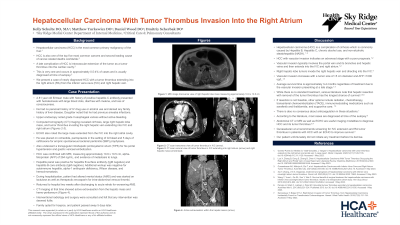Tuesday Poster Session
Category: Liver
P3867 - Hepatocellular Carcinoma With Tumor Thrombus Invasion into the Right Atrium
Tuesday, October 24, 2023
10:30 AM - 4:00 PM PT
Location: Exhibit Hall

Has Audio

Kelly Schulte, DO
Sky Ridge Medical Center
Lone Tree, CO
Presenting Author(s)
Kelly Schulte, DO, Matthew Yurkewicz, DO, Daniel Wood, DO, Dmitriy Scherbak, DO
Sky Ridge Medical Center, Lone Tree, CO
Introduction: Hepatocellular carcinoma (HCC) is the most common primary malignancy of the liver and one of the top five most common cancers worldwide. A late complication of HCC is intravascular extension of the tumor as a tumor thrombus into the cardiac cavity. This is very rare and typically occurs in approximately 0.5-4% of cases. We present a case of newly diagnosed HCC with a tumor thrombus extending into the right atrium from the inferior vena cava (IVC) and right hepatic vein.
Case Description/Methods: A 81 year old Eritean male presented with hematemesis, melena, and loss of consciousness. He reported a history of positive hepatitis C antibodies of unclear etiology with no other medical history and denied alcohol use. CT imaging revealed cirrhosis with a large right hepatic lobe mass and tumor thrombus invading the right hepatic vein into the IVC and right atrium. He underwent an upper endoscopy which showed grade II esophageal varices without active bleeding. ECHO showed a large mass extending from IVC to the right atrium. A transjugular intrahepatic portosystemic shunt and gastric variceal embolization was completed for his portal hypertension. Octreotide, pantoprazole, and ceftriaxone were initiated for empiric coverage. HCC was confirmed with MRI and alpha-fetoprotein (AFP) of 264 ng/mL. Further testing was negative for autoimmune hepatitis, alpha-1 antitrypsin deficiency, Wilson disease, and hemochromatosis. He was discharged to acute rehab with plans to follow up with Oncology. He returned to the hospital 2 weeks later for worsening abdominal distension and altered mental status. CT imaging showed active extravasation from the hepatic mass and hemoperitoneum. Further intervention was deemed futile. Family opted for hospice care and he died 3 days later.
Discussion: HCC primarily develops from cirrhosis, commonly caused by hepatitis B, hepatitis C, chronic alcohol abuse, and non-alcoholic steatohepatitis. HCC with vascular invasion indicates an advanced stage with poor prognosis. Average survival time is approximately 3-4 months regardless of treatment. According to literature, most cases are diagnosed at time of autopsies. Vascular invasion increases with tumor size ( >5 cm diameter) and AFP >1000 ug/L. Treatment includes supportive care, tumor resection, radiation, transarterial chemoembolization, and medications like sorafenib and thalidomide. However, there is no standard treatment regimen. Our patient’s HCC was 13 cm in diameter and had not yet initiated any treatment before his demise.
Disclosures:
Kelly Schulte, DO, Matthew Yurkewicz, DO, Daniel Wood, DO, Dmitriy Scherbak, DO. P3867 - Hepatocellular Carcinoma With Tumor Thrombus Invasion into the Right Atrium, ACG 2023 Annual Scientific Meeting Abstracts. Vancouver, BC, Canada: American College of Gastroenterology.
Sky Ridge Medical Center, Lone Tree, CO
Introduction: Hepatocellular carcinoma (HCC) is the most common primary malignancy of the liver and one of the top five most common cancers worldwide. A late complication of HCC is intravascular extension of the tumor as a tumor thrombus into the cardiac cavity. This is very rare and typically occurs in approximately 0.5-4% of cases. We present a case of newly diagnosed HCC with a tumor thrombus extending into the right atrium from the inferior vena cava (IVC) and right hepatic vein.
Case Description/Methods: A 81 year old Eritean male presented with hematemesis, melena, and loss of consciousness. He reported a history of positive hepatitis C antibodies of unclear etiology with no other medical history and denied alcohol use. CT imaging revealed cirrhosis with a large right hepatic lobe mass and tumor thrombus invading the right hepatic vein into the IVC and right atrium. He underwent an upper endoscopy which showed grade II esophageal varices without active bleeding. ECHO showed a large mass extending from IVC to the right atrium. A transjugular intrahepatic portosystemic shunt and gastric variceal embolization was completed for his portal hypertension. Octreotide, pantoprazole, and ceftriaxone were initiated for empiric coverage. HCC was confirmed with MRI and alpha-fetoprotein (AFP) of 264 ng/mL. Further testing was negative for autoimmune hepatitis, alpha-1 antitrypsin deficiency, Wilson disease, and hemochromatosis. He was discharged to acute rehab with plans to follow up with Oncology. He returned to the hospital 2 weeks later for worsening abdominal distension and altered mental status. CT imaging showed active extravasation from the hepatic mass and hemoperitoneum. Further intervention was deemed futile. Family opted for hospice care and he died 3 days later.
Discussion: HCC primarily develops from cirrhosis, commonly caused by hepatitis B, hepatitis C, chronic alcohol abuse, and non-alcoholic steatohepatitis. HCC with vascular invasion indicates an advanced stage with poor prognosis. Average survival time is approximately 3-4 months regardless of treatment. According to literature, most cases are diagnosed at time of autopsies. Vascular invasion increases with tumor size ( >5 cm diameter) and AFP >1000 ug/L. Treatment includes supportive care, tumor resection, radiation, transarterial chemoembolization, and medications like sorafenib and thalidomide. However, there is no standard treatment regimen. Our patient’s HCC was 13 cm in diameter and had not yet initiated any treatment before his demise.
Disclosures:
Kelly Schulte indicated no relevant financial relationships.
Matthew Yurkewicz indicated no relevant financial relationships.
Daniel Wood indicated no relevant financial relationships.
Dmitriy Scherbak indicated no relevant financial relationships.
Kelly Schulte, DO, Matthew Yurkewicz, DO, Daniel Wood, DO, Dmitriy Scherbak, DO. P3867 - Hepatocellular Carcinoma With Tumor Thrombus Invasion into the Right Atrium, ACG 2023 Annual Scientific Meeting Abstracts. Vancouver, BC, Canada: American College of Gastroenterology.
